人教版高中英语必修四Unit 4 Body Language Reading 课件 (51张)
文档属性
| 名称 | 人教版高中英语必修四Unit 4 Body Language Reading 课件 (51张) |
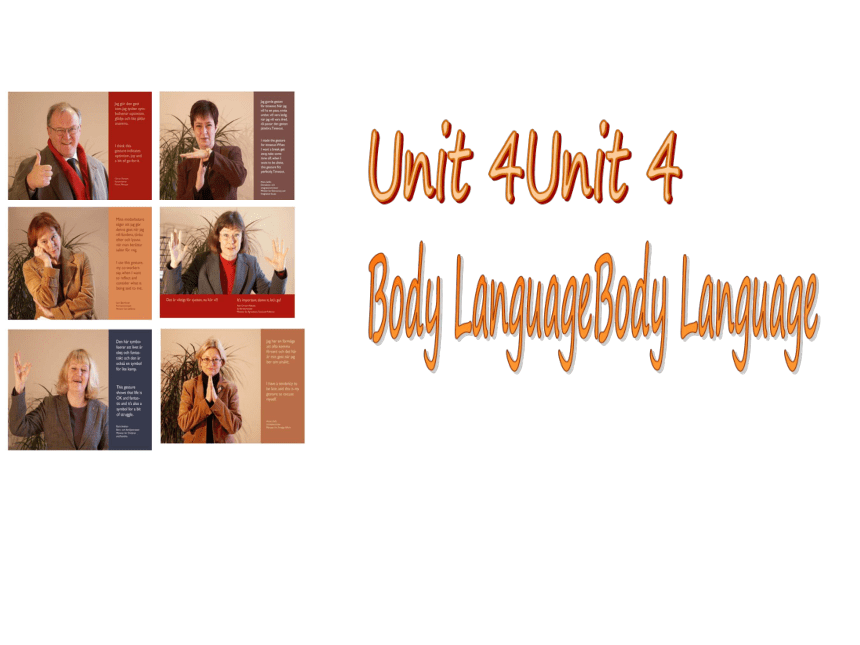
|
|
| 格式 | zip | ||
| 文件大小 | 3.7MB | ||
| 资源类型 | 教案 | ||
| 版本资源 | 人教版(新课程标准) | ||
| 科目 | 英语 | ||
| 更新时间 | 2021-07-04 18:42:13 | ||
图片预览


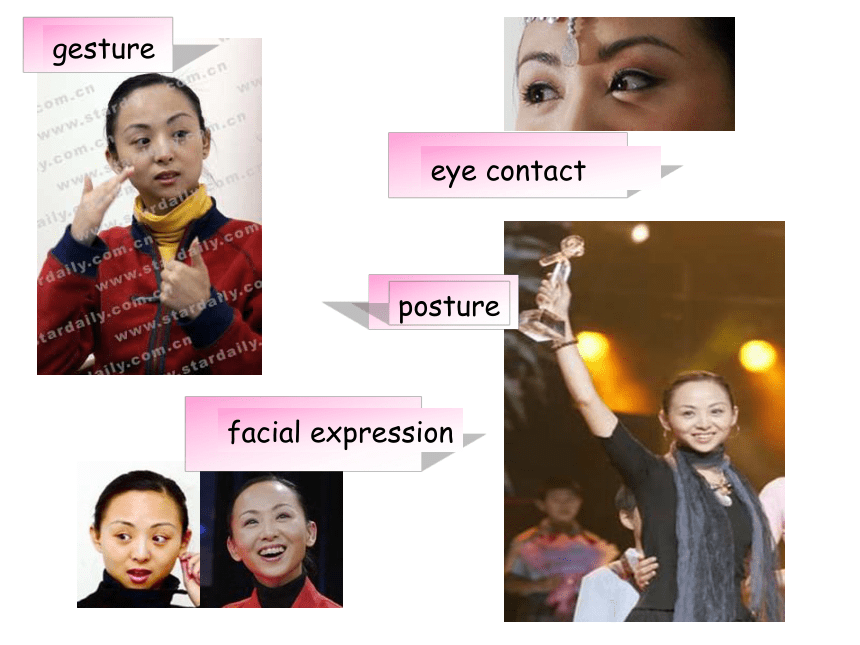

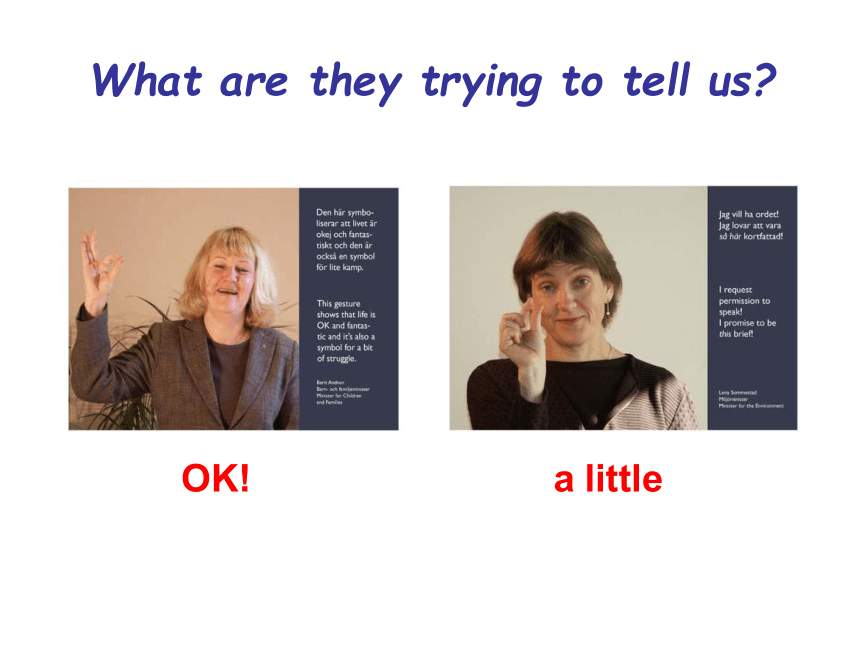
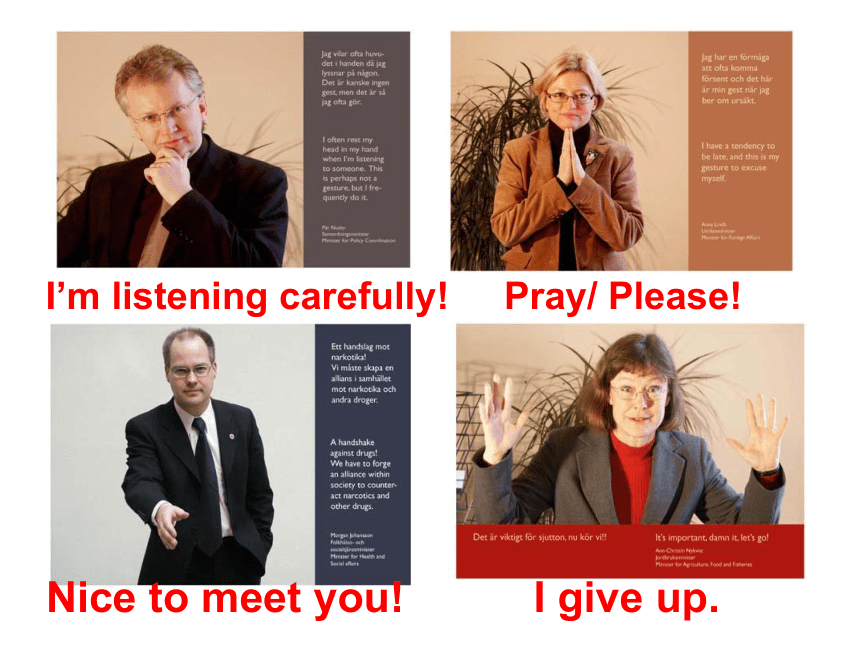
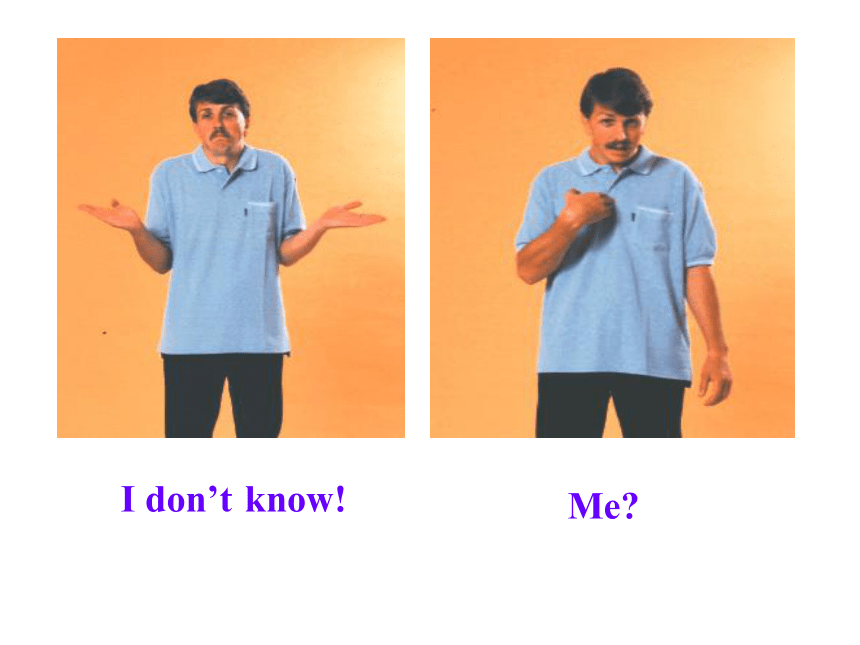
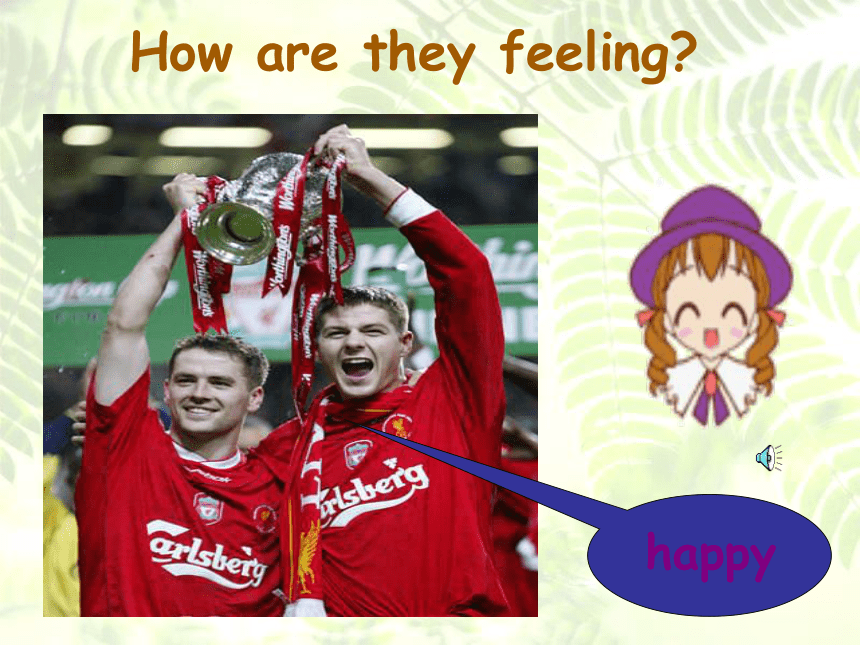
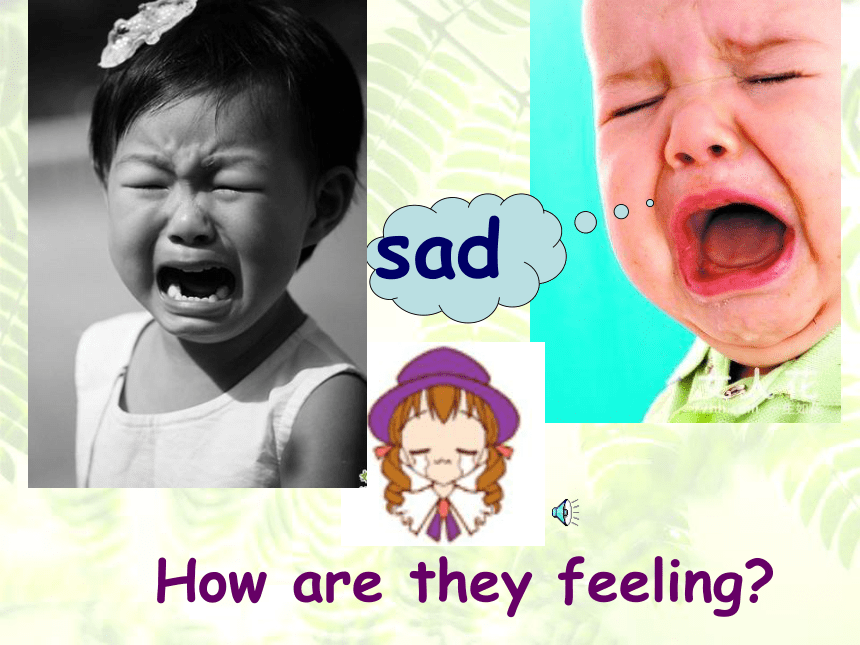

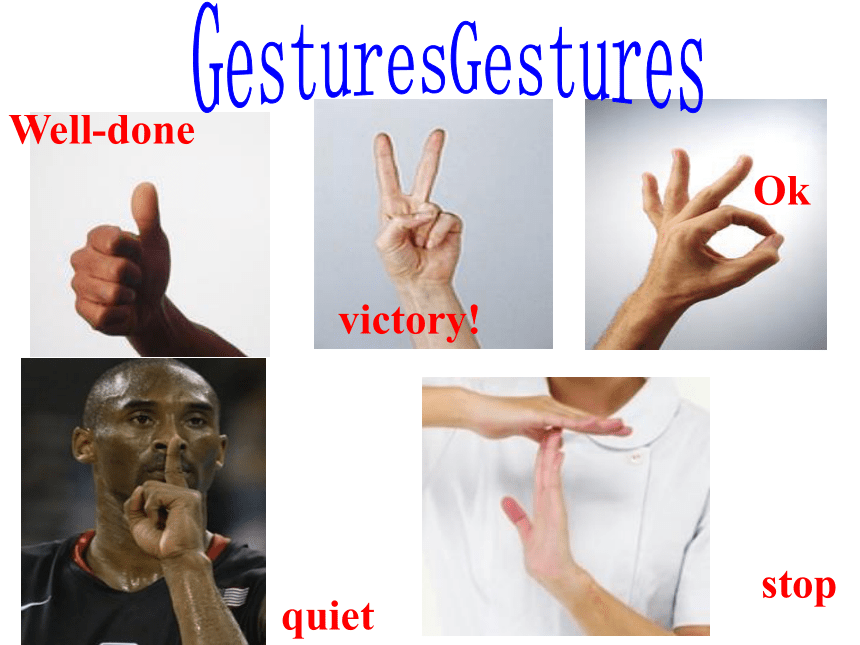

文档简介
(共51张PPT)
Unit
4
Body
Language
She
is
deaf
and
dump,
so
body
language
plays
a
very
important
part
in
her
life.
gesture
eye
contact
posture
facial
expression
What
is
Body
Language?
Body
language
is
one
form
of
communication
without
using
any
words.
But
use
eye
contacts,
facial
expressions,gestures
and
postures.
What
are
they
trying
to
tell
us?
OK!
a
little
Nice
to
meet
you!
I
give
up.
Pray/
Please!
I’m
listening
carefully!
Me?
I
don’t
know!
How
are
they
feeling?
happy
How
are
they
feeling?
sad
How
is
he
feeling?
angry
Well-done
Ok
stop
quiet
Gestures
victory!
Game
A
B
C
Choose
one
below.
One
student
performs
and
the
other
guesses.
Different
ways
to
greet
handshake
a
loving
hug
a
kiss
on
the
cheek
nose-
kiss
two
palms
together
bowing
Reading
Communication:
No
problem?
Words
and
expressions
preview
represent
association
dormitory
approach
defence
curious
vt.
代表;象征
defend
against
保卫…以免受
in
general
总的来说,通常
adj.
好奇的
n.
防御;保卫
vi.
&
vt.
接近;靠近;走进
n.
宿舍
n.
社团;联系;联想
Where
are
the
international
students
going
to
study?
How
many
international
students
are
mentioned
in
the
passage?
Do
all
students
greet
each
other
in
the
same
way
?
Six
students.
No,
they
don’t.
They
were
going
to
study
in
Beijing
University.
Listen
and
read
I
male
or
female
Male:
Ahmed
Aziz
moves
very
close
to
me
and
ask
me
a
question,
and
shakes
my
hands.
male
Match
the
right
main
idea
of
each
part.
I
went
to
the
Airport
to
meet
the
international
students.
People
from
different
countries
have
different
body
language.
Summary
of
body
language.
Part
1
(Para.
1)
Part
2
(Para.
2-4
)
Part
3
(Para.
5
)
A
B
C
Detailed
reading
:
Para1
Time:
__________________________
People:
______________________________
______________________________________
Place:
_______________________________
What
to
do:
____________________________
_______________________________________
_______________________________________
yesterday
another
student
and
I,
the
Capital
International
Airport
this
year’s
international
students
We
would
take
them
first
to
their
dormitories
and
then
to
the
student
canteen.
Find
out
the
two
cultural
mistakes
in
Para2:
Tony
Garcia
Julia
Smith
The
first
mistake
(Columbia
)
(Britain)
He
approached
Julia,
________
_____
_________and
_______
her
on
the
________.
She
______
________
appearing
_________
and
put
up
her
hands,
as
if
___
_______.
shoulder
touched
her
kissed
cheek
stepped
back
surprised
in
defence
The
second
mistake
Akira
Nagata
(Japanese)
George
Cook
(Canada)
He
________
his
hand
________
to
the
Japanese
student.
He
________
so
his
nose
________George’s
_______
________.
bowed
touched
moving
hand
reached
out
How
do
men
from
Muslim
countries
greet
others
?
2.
How
did
Tony
and
Darlene
greet
each
other?
Para3:
They
shook
hands
and
then
kissed
each
other
twice
on
each
cheek,
and
this
is
the
French
custom
when
adults
meet
people
they
know.
To
men:
To
women:
stand
close,
and
shake
hands
nodding
People
in
the
country/area
Ways
to
greet
each
other
English
people
People
from
Spain,
Italy
and
South
American
countries
Japanese
Most
people
around
the
world
Approach
others
closely
and
are
more
likely
to
touch
them.
Do
not
stand
very
close
to
others
or
touch
strangers
when
they
meet.
Bow
Shake
hands
Fill
in
the
table
according
to
Para4:
Para
5:
These
_______
are
not
good
or
bad,
but
are
_____
ways
____
_______
cultures
have
developed.
Do
all
members
of
a
culture
behave
in
the
same
way?
In
general,
studying
_____________
__________
can
certainly
help
______
______________
in
today’s
world
of
cultural
crossroads!
No,
not
all
members
of
a
culture
behave
in
the
same
way.
international
customs
avoid
difficulties
actions
simply
in
which
Englishmen
often
stand
close
to
others
or
touch
strangers
as
soon
as
they
meet.
Most
people
around
the
world
now
greet
each
other
by
shaking
hands
.
Japanese
will
bow
to
others
as
greeting.
People
from
Jordan
will
shake
hands
with
a
woman
as
she
introduces
herself
to
them.
Body
language
in
some
countries
is
good
while
some
in
others
is
bad.
Read
the
passage
again,
and
then
decide
the
following
statements
are
true
(T)
or
false
(F).
T
F
F
F
T
Do
you
think
body
language
is
important?
Can
you
give
some
examples
in
our
daily
life?
Discussion
Unit
4
Language
Points
1.
represent
vt.
代表;象征;描绘
The
rose
represents
Love.
玫瑰象征爱情。
He
represented
our
school
at
the
meeting
.
他代表我们学校参加会议。
This
painting
represents
a
storm.
这幅画描绘的是暴风雨。
representative
n.
代理人;
代表
adj.
典型的,有代表性的
a
local
representative
当地代理人
a
student
representative
学生代表
a
~collection
of
the
Chinese
stamps
有代表性的一集中国邮票
2.
I
saw
several
young
people
enter
the
waiting
area
looking
around
curiously.
curious
adj.
=
eager
to
learn
or
know
be
curious
about
sth.
对……好奇
be
curious
to
do
sth.
急于……
out
of
curiosity
出于好奇
[考例]
People
have
always
been
curious
________
how
living
things
on
the
earth
exactly
began.
(辽宁2006)
A.
in
B.
at
C.
of
D.
about
[点拨]
本题考查了be
curious
about
sth.
结构。
2.approach
vt.
&vi.
接近;靠近;走近
He
approached
me
with
stealthy
steps.
他悄然走近我。
He
is
rather
difficult
to
approach.
他不大容易接触。
The
summer
is
approaching.
夏季即将来临。
n.
接近;方法;途径
We
heard
the
approach
of
the
train.
我们听见火车开过来了。
An
approach
to
doing
/sth.
做某事的方法.
We’ve
found
a
new
approach
to
the
problem
.
On
the
approach
of
death
临死的时候
3.
Tony
approached
Julia,
touched
her
shoulder
and
kissed
her
on
the
cheek.
verb
+
sb.
in/
on/
by
+the
身体部位
Mary
was
so
excited!
She
grabbed
me
by
the
arm
and
shook
me
hard,
laughing
and
crying.
He
caught
the
thief
by
the
hand
and
held
it
tightly.
4.defence
n.
防御,防护,保卫
Attack
is
the
best
defence.
进攻是最好的防御。
in
defence
(of
)
保卫…,守护…
They
were
brave
in
defence.
他们勇敢防守.
They
decided
to
fight
in
defence
of
their
country.
他们决定战斗保卫他们的国家。
defend
vt.
保卫;保护
They
fought
to
defend
their
country.
他们为保卫祖国而战斗.
You
are
defending
yourself.
你在为自己辩护。
defend…against
/
from=
protect…against/
from
保护……以免
The
duty
of
the
soldiers
is
to
defend
us
against
enemy.
He
defended
his
students
the
earthquake.
他保护学生使其不受地震的伤害。
against/from
5.Not
all
cultures
greet
each
other
the
same
way,
nor
are
they
Comfortable
in
the
same
way
with
touching
or
distance
between
people.
1)
not
all
部分否定=all
…
not
Not
all
the
children
are
naughty.
=
All
the
children
are
not
naughty
拓展
every
…
not
=
not
every并非每个
both
…
not
=
not
both
并非两个都
They
do
not
shake
hands
with
women,
______
(他们也不可能)kiss
women
publicly.
nor
连词,“也不”,连接否定的并列成分。
nor
are
they
likely
to
I
have
no
brothers,
nor
any
sisters.
Neither
my
mother
nor
my
father
went
to
university.
(be动词、助动词或情态动词放在主语前)
Nobody
can
learn
body
language
in
one
day,
________.
nor
can
I
2)
nor
5.
likely
常用于
sb.
/sth.
is
likely
to
do
sth.
It
is
likely
that…
英语几乎不能说:
it’s
likely
to
do
sth.
It
is
likely
to
rain.
(句子中的it是天气,
并不是形式主语。)
主语既可以是人也可是物
The
train
is
likely
to
be
late.
火车有可能晚点。
She
is
the
most
likely
to
win
the
prize.
她最有可能获奖。
It’s
very
likely
that
she’ll
ring
me
tonight.
=
She’s
very
likely
to
ring
me
tonight.
It’s
highly
likely
that
he
will
succeed.
2.
probable:
常用于结构:
it
is
probable
+that
主语不能是人,
几
乎不能说it
is
probable
to
do
sth.
possible
常常用于下列结构:
It
is
possible
for
sb.
to
do
sth.
It
is
possible
that
从句
主语不能是人
likely,
probable,
possible
1.
New
drivers
are
far
more
to
have
accidents
than
experienced
drivers.
2.
Don’t
worry.
He
is
to
get
in
touch
with
you.
3.
Could
you
open
that
window
for
me?
(表示委婉请求)
likely
likely
possibly
6.
general
1).
adj.
普遍的,全面的,一般性的
a
matter
of
~
concern/
interest
普遍(公众)关心/感兴趣的事情
general
knowledge
常识
2).总的,大体的
general
idea
of
the
passage
in
general:总的来说
=generally
speaking
In
general,
he
is
a
good
guy.
Thank
You!
Bye
-Bye!
Postures
that
have
different
meanings:
Japan
money
France
Zero
Brazil
&
Germany
rude
US
Nigeria
Germany
&
Japan
Great
&
good
job
rude
Number
one
When
in
Rome,
do
as
Romans
do.
(入乡随俗)
Travel
around
the
world
↙Jordan←
France↖
China
Britain
↘Japan
→
Colombia↗
Writing
Your
best
friend
Li
Lei
is
going
to
travel
abroad,
please
write
a
letter
to
tell
him
some
tips
about
the
different
greeting
ways
in
those
foreign
countries.
angry
laugh
drink
stop
Great/good!
surprise
telephone/call
fly
Be
quiet.
Come
here!
happy
cry
swim
play
basketball
I’m
thinking!
Facial
Expressions
angry
scared
恐惧
happy
sad
contempt
轻视
surprised
disgust
厌恶
Unit
4
Body
Language
She
is
deaf
and
dump,
so
body
language
plays
a
very
important
part
in
her
life.
gesture
eye
contact
posture
facial
expression
What
is
Body
Language?
Body
language
is
one
form
of
communication
without
using
any
words.
But
use
eye
contacts,
facial
expressions,gestures
and
postures.
What
are
they
trying
to
tell
us?
OK!
a
little
Nice
to
meet
you!
I
give
up.
Pray/
Please!
I’m
listening
carefully!
Me?
I
don’t
know!
How
are
they
feeling?
happy
How
are
they
feeling?
sad
How
is
he
feeling?
angry
Well-done
Ok
stop
quiet
Gestures
victory!
Game
A
B
C
Choose
one
below.
One
student
performs
and
the
other
guesses.
Different
ways
to
greet
handshake
a
loving
hug
a
kiss
on
the
cheek
nose-
kiss
two
palms
together
bowing
Reading
Communication:
No
problem?
Words
and
expressions
preview
represent
association
dormitory
approach
defence
curious
vt.
代表;象征
defend
against
保卫…以免受
in
general
总的来说,通常
adj.
好奇的
n.
防御;保卫
vi.
&
vt.
接近;靠近;走进
n.
宿舍
n.
社团;联系;联想
Where
are
the
international
students
going
to
study?
How
many
international
students
are
mentioned
in
the
passage?
Do
all
students
greet
each
other
in
the
same
way
?
Six
students.
No,
they
don’t.
They
were
going
to
study
in
Beijing
University.
Listen
and
read
I
male
or
female
Male:
Ahmed
Aziz
moves
very
close
to
me
and
ask
me
a
question,
and
shakes
my
hands.
male
Match
the
right
main
idea
of
each
part.
I
went
to
the
Airport
to
meet
the
international
students.
People
from
different
countries
have
different
body
language.
Summary
of
body
language.
Part
1
(Para.
1)
Part
2
(Para.
2-4
)
Part
3
(Para.
5
)
A
B
C
Detailed
reading
:
Para1
Time:
__________________________
People:
______________________________
______________________________________
Place:
_______________________________
What
to
do:
____________________________
_______________________________________
_______________________________________
yesterday
another
student
and
I,
the
Capital
International
Airport
this
year’s
international
students
We
would
take
them
first
to
their
dormitories
and
then
to
the
student
canteen.
Find
out
the
two
cultural
mistakes
in
Para2:
Tony
Garcia
Julia
Smith
The
first
mistake
(Columbia
)
(Britain)
He
approached
Julia,
________
_____
_________and
_______
her
on
the
________.
She
______
________
appearing
_________
and
put
up
her
hands,
as
if
___
_______.
shoulder
touched
her
kissed
cheek
stepped
back
surprised
in
defence
The
second
mistake
Akira
Nagata
(Japanese)
George
Cook
(Canada)
He
________
his
hand
________
to
the
Japanese
student.
He
________
so
his
nose
________George’s
_______
________.
bowed
touched
moving
hand
reached
out
How
do
men
from
Muslim
countries
greet
others
?
2.
How
did
Tony
and
Darlene
greet
each
other?
Para3:
They
shook
hands
and
then
kissed
each
other
twice
on
each
cheek,
and
this
is
the
French
custom
when
adults
meet
people
they
know.
To
men:
To
women:
stand
close,
and
shake
hands
nodding
People
in
the
country/area
Ways
to
greet
each
other
English
people
People
from
Spain,
Italy
and
South
American
countries
Japanese
Most
people
around
the
world
Approach
others
closely
and
are
more
likely
to
touch
them.
Do
not
stand
very
close
to
others
or
touch
strangers
when
they
meet.
Bow
Shake
hands
Fill
in
the
table
according
to
Para4:
Para
5:
These
_______
are
not
good
or
bad,
but
are
_____
ways
____
_______
cultures
have
developed.
Do
all
members
of
a
culture
behave
in
the
same
way?
In
general,
studying
_____________
__________
can
certainly
help
______
______________
in
today’s
world
of
cultural
crossroads!
No,
not
all
members
of
a
culture
behave
in
the
same
way.
international
customs
avoid
difficulties
actions
simply
in
which
Englishmen
often
stand
close
to
others
or
touch
strangers
as
soon
as
they
meet.
Most
people
around
the
world
now
greet
each
other
by
shaking
hands
.
Japanese
will
bow
to
others
as
greeting.
People
from
Jordan
will
shake
hands
with
a
woman
as
she
introduces
herself
to
them.
Body
language
in
some
countries
is
good
while
some
in
others
is
bad.
Read
the
passage
again,
and
then
decide
the
following
statements
are
true
(T)
or
false
(F).
T
F
F
F
T
Do
you
think
body
language
is
important?
Can
you
give
some
examples
in
our
daily
life?
Discussion
Unit
4
Language
Points
1.
represent
vt.
代表;象征;描绘
The
rose
represents
Love.
玫瑰象征爱情。
He
represented
our
school
at
the
meeting
.
他代表我们学校参加会议。
This
painting
represents
a
storm.
这幅画描绘的是暴风雨。
representative
n.
代理人;
代表
adj.
典型的,有代表性的
a
local
representative
当地代理人
a
student
representative
学生代表
a
~collection
of
the
Chinese
stamps
有代表性的一集中国邮票
2.
I
saw
several
young
people
enter
the
waiting
area
looking
around
curiously.
curious
adj.
=
eager
to
learn
or
know
be
curious
about
sth.
对……好奇
be
curious
to
do
sth.
急于……
out
of
curiosity
出于好奇
[考例]
People
have
always
been
curious
________
how
living
things
on
the
earth
exactly
began.
(辽宁2006)
A.
in
B.
at
C.
of
D.
about
[点拨]
本题考查了be
curious
about
sth.
结构。
2.approach
vt.
&vi.
接近;靠近;走近
He
approached
me
with
stealthy
steps.
他悄然走近我。
He
is
rather
difficult
to
approach.
他不大容易接触。
The
summer
is
approaching.
夏季即将来临。
n.
接近;方法;途径
We
heard
the
approach
of
the
train.
我们听见火车开过来了。
An
approach
to
doing
/sth.
做某事的方法.
We’ve
found
a
new
approach
to
the
problem
.
On
the
approach
of
death
临死的时候
3.
Tony
approached
Julia,
touched
her
shoulder
and
kissed
her
on
the
cheek.
verb
+
sb.
in/
on/
by
+the
身体部位
Mary
was
so
excited!
She
grabbed
me
by
the
arm
and
shook
me
hard,
laughing
and
crying.
He
caught
the
thief
by
the
hand
and
held
it
tightly.
4.defence
n.
防御,防护,保卫
Attack
is
the
best
defence.
进攻是最好的防御。
in
defence
(of
)
保卫…,守护…
They
were
brave
in
defence.
他们勇敢防守.
They
decided
to
fight
in
defence
of
their
country.
他们决定战斗保卫他们的国家。
defend
vt.
保卫;保护
They
fought
to
defend
their
country.
他们为保卫祖国而战斗.
You
are
defending
yourself.
你在为自己辩护。
defend…against
/
from=
protect…against/
from
保护……以免
The
duty
of
the
soldiers
is
to
defend
us
against
enemy.
He
defended
his
students
the
earthquake.
他保护学生使其不受地震的伤害。
against/from
5.Not
all
cultures
greet
each
other
the
same
way,
nor
are
they
Comfortable
in
the
same
way
with
touching
or
distance
between
people.
1)
not
all
部分否定=all
…
not
Not
all
the
children
are
naughty.
=
All
the
children
are
not
naughty
拓展
every
…
not
=
not
every并非每个
both
…
not
=
not
both
并非两个都
They
do
not
shake
hands
with
women,
______
(他们也不可能)kiss
women
publicly.
nor
连词,“也不”,连接否定的并列成分。
nor
are
they
likely
to
I
have
no
brothers,
nor
any
sisters.
Neither
my
mother
nor
my
father
went
to
university.
(be动词、助动词或情态动词放在主语前)
Nobody
can
learn
body
language
in
one
day,
________.
nor
can
I
2)
nor
5.
likely
常用于
sb.
/sth.
is
likely
to
do
sth.
It
is
likely
that…
英语几乎不能说:
it’s
likely
to
do
sth.
It
is
likely
to
rain.
(句子中的it是天气,
并不是形式主语。)
主语既可以是人也可是物
The
train
is
likely
to
be
late.
火车有可能晚点。
She
is
the
most
likely
to
win
the
prize.
她最有可能获奖。
It’s
very
likely
that
she’ll
ring
me
tonight.
=
She’s
very
likely
to
ring
me
tonight.
It’s
highly
likely
that
he
will
succeed.
2.
probable:
常用于结构:
it
is
probable
+that
主语不能是人,
几
乎不能说it
is
probable
to
do
sth.
possible
常常用于下列结构:
It
is
possible
for
sb.
to
do
sth.
It
is
possible
that
从句
主语不能是人
likely,
probable,
possible
1.
New
drivers
are
far
more
to
have
accidents
than
experienced
drivers.
2.
Don’t
worry.
He
is
to
get
in
touch
with
you.
3.
Could
you
open
that
window
for
me?
(表示委婉请求)
likely
likely
possibly
6.
general
1).
adj.
普遍的,全面的,一般性的
a
matter
of
~
concern/
interest
普遍(公众)关心/感兴趣的事情
general
knowledge
常识
2).总的,大体的
general
idea
of
the
passage
in
general:总的来说
=generally
speaking
In
general,
he
is
a
good
guy.
Thank
You!
Bye
-Bye!
Postures
that
have
different
meanings:
Japan
money
France
Zero
Brazil
&
Germany
rude
US
Nigeria
Germany
&
Japan
Great
&
good
job
rude
Number
one
When
in
Rome,
do
as
Romans
do.
(入乡随俗)
Travel
around
the
world
↙Jordan←
France↖
China
Britain
↘Japan
→
Colombia↗
Writing
Your
best
friend
Li
Lei
is
going
to
travel
abroad,
please
write
a
letter
to
tell
him
some
tips
about
the
different
greeting
ways
in
those
foreign
countries.
angry
laugh
drink
stop
Great/good!
surprise
telephone/call
fly
Be
quiet.
Come
here!
happy
cry
swim
play
basketball
I’m
thinking!
Facial
Expressions
angry
scared
恐惧
happy
sad
contempt
轻视
surprised
disgust
厌恶
同课章节目录
